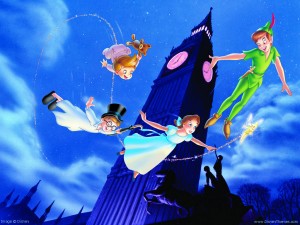Old Yeller
Posted on December 13, 2002 at 5:17 am
Plot: In 1869 Texas, Jim Coates (Fess Parker) says goodbye to his family, as he leaves for three months to sell their cattle. He tells his older son, Travis (Tommy Kirk) to take care of his mother, Katie (Dorothy McGuire) and his younger brother, Arliss (Kevin Corcoran). Travis asks his father to bring him back a horse. His father says that what he needs is a dog, but Travis does not want one. “Not a dog in this world like old Belle was.”
A stray dog comes to their farm and scares the horse, knocking over Travis and knocking down the fence. Travis throws rocks at the dog, saying, “That dog better not come around here while I got a gun.” But the dog comes back and Arliss “claims” him, over Travis’ objections. Later, Old Yeller saves Arliss from a bear. Travis admits, “He’s a heap more dog than I ever figured him for.” Yeller turns out to be an outstanding dog for farming and hunting.
Old Yeller fights a wolf that was about to attack Katie. She insists he be tied up, because the wolf would not have attacked unless he had hydrophobia, and Yeller may have been infected. When Yeller becomes vicious, Travis knows he must shoot him.
Jim returns, as Travis and his friend Elsbeth are burying Old Yeller. Jim tells him that the loss of Yeller is “not a thing you can forget. Maybe not a thing you want to forget…Now and then, for no good reason a man can figure out, life will just haul off and knock him flat. Slam him agin’ the ground so hard it seems like all his insides is busted. It’s not all like that. A lot of it’s mighty fine. You can’t afford to waste the good part worrying about the bad. That makes it all bad…Sayin’ it’s one thing and feelin’ it’s another. I’ll tell you a trick that’s sometimes a big help. Start looking around for something good to take the place of the bad. As a general rule, you can find it.” Jim has brought the horse Travis wanted, but says, “Reckon you ain’t in no shape to take pleasure in him yet.” Travis goes back to the house, where he sees Yeller’s pup, and knows that he won’t replace Old Yeller, but will be as good a friend as his father was.
Discussion: Jim’s talk with Travis is a model of parental wisdom, understanding, and patience. He accepts and validates Travis’ feelings completely, and does not try to minimize or talk him out of them. (Contrast that with Elsbeth, who tries to comfort Travis by encouraging him to “come to like the pup.”) Instead of telling him what to do, he says, “I’ll tell you a trick that’s sometimes a big help,” letting him decide for himself whether to take the advice and, if he does, letting him decide whether this is one of the times that it is a big help or not. By saying that Travis is not “in shape to take pleasure from the horse” yet, Jim is again letting him know that he respects his feelings of loss and sorrow, and that there will be time for him to feel happy about the horse later.
Travis is not just reluctant to adopt Old Yeller at first — he is downright hostile. The reason is his sense of loss over his first dog, Belle. His ability to accept Young Yeller more easily shows how much he has grown up.
This is one of the finest of the early Disney dramas. The fight scenes are exciting and the family scenes are sensitive and evocative. It is a classic of loss, and an excellent way to begin a discussion of those issues.
Questions for Kids:
· Why doesn’t Travis want Old Yeller at first? Why doesn’t he want the pup?
· How does he hurt Elsbeth’s feelings?
· Why does Katie say “No wonder they didn’t want him on no cow drive” about Elsbeth’s father?
· Why did Sanderson trade Old Yeller for the toad and a meal?
· Why did Sanderson say “that’s the way a man talks” when Travis told him that he was a little scared but would take Sanderson’s advice? What made that “manly”?
Connections: McGuire, Kirk, and Corcoran appeared together in “Swiss Family Robinson.”
Activities: Kids who like animal stories may enjoy the book by Fred Gipson, who co-wrote the screenplay.

